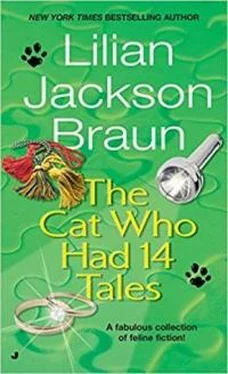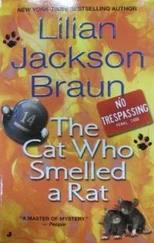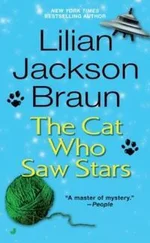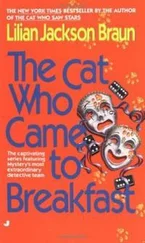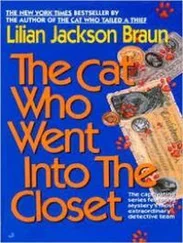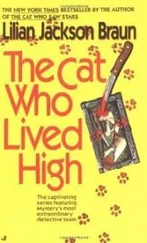He was a portly silver tabby with a gray-and-black coat patterned as precisely as a butterfly’s wing. Something about his strong, fierce face gave an impression of integrity, rather like a benevolent man-eating tiger.
Percy spent summer weekends at a rustic chalet in the north woods—on the shore of the exclusive Big Pine Lake. Here he dozed away the hours in the company of Cornelius and Margaret or stared unblinking at the placid lake.
Cornelius was a comfortable middle-aged attorney with equally quiet tastes. He too was portly and had Percy’s look of integrity. On weekends Cornelius worked jigsaw puzzles, took untaxing strolls with his wife, or went through the motions of fishing. Margaret knitted sweaters or puttered lovingly in the push-button kitchen. When they entertained, their guests were calm, temperate, and middle-aged, with no great desire to exert themselves. Everything was quite civilized and dull—the way Percy liked it—until the weekend of the big puddle.
Bill Diddleton and his wife had been invited to spend Saturday and Sunday at the chalet. The bar was stocked with the expensive brands that Cornelius took pride in serving, and the refrigerator contained Margaret’s specialties: shrimp bisque, veal in aspic, and blueberry buckle. Her chief delight was the feeding of guests; for Cornelius the greatest pleasure came when he tied on a chef’s apron and broiled the steaks that he ordered from Texas.
“I wonder what Bill’s new wife will be like,” Margaret murmured over her knitting as they awaited the arrival of the Diddletons. “I hope she appreciates good food.”
“A piece of this puzzle is missing,” said Cornelius, frowning at a jigsaw version of the Mona Lisa.
“It’s under your left foot, dear. Do you think Percy will object to Bill? He’s rather a boisterous character.”
At the sound of his name Percy raised his head. He noticed the ball of yarn unwinding, but it failed to tempt him. He never disturbed Margaret’s knitting or Cornelius’s jigsaw puzzles.
The man beamed a brotherly smile at the silver tabby. “Percy, the gentleman you are about to meet is an excellent client of mine, and we shall all endeavor to tolerate his bombast for thirty-six hours.”
Percy squeezed his eyes in casual consent, but when the Diddletons arrived, shouting and squealing and creating a general uproar, he retired to the balcony where he could observe from a discreet distance.
The woman, small and nervous, spoke in a shrill voice, and Percy put her in the classification with small yipping dogs. Nevertheless, he stared in fascination at her jewelry, which flashed in the shafts of sunlight slanting into the chalet. The man was muscular, arrogant, and active, like some of the boxer dogs Percy had encountered. The silver tabby had strong opinions about that particular breed.
Upon entering the chalet Bill Diddleton caught sight of a horizontal beam spanning the living room, and he jumped up and hand-walked the length of it. The irregularity of this conduct made Percy squirm uncomfortably.
“Well, well!” said Cornelius in his best genial tone. “After that exhibition of athletic prowess I daresay you are ready for a drink, my boy. And what is Mrs. Diddleton’s pleasure, may I ask?”
“Call me Deedee,” she said.
“Indeed! So I shall. Now, might I offer you a fine eighteen-year-old Scotch?”
“I’ve got a better idea,” said Bill. “Just show me the bar and I’ll mix you a drink you’ll never forget. Got any tomato juice?”
“Bill’s famous for this cute drink,” said his wife. “It’s tomato juice, ginger ale, Scotch, and . . .” Rolling her eyes upward to recollect the fourth ingredient, she shrieked. A disembodied head with staring eyes was wedged between the balusters of the balcony railing.
“That’s only our Percy,” Margaret explained. “He’s not as menacing as he looks.”
“A cat! I can’t stand cats!”
Percy sensed that the weekend was beginning poorly, and he was right. For lunch Margaret had planned a lobster soufflé, to be followed by her special salad that she prepared at the table, basking in the flattering comments of guests. On this occasion Bill Diddleton insisted, however, on presiding at the salad bowl.
“You sit down and take it easy, Meg honey,” he said, “and I’ll show you how the experts toss greens.”
“Isn’t it wonderful the way Bill takes over?” Deedee said. “He’s a wonderful cook. He made one of his wonderful cakes for this weekend.”
“I call it a Lucky Seven torte,” Bill said. “Seven layers, with seven different kinds of booze. It has to ripen twenty-four hours before we can eat it . . . . What’s the matter, Meg? Afraid of a few calories?”
“Not at all,” said Margaret lightly. “It’s just that I had planned—”
“Now let’s get this straight, honey. I don’t want you folks going to a lot of trouble. It was great of you to invite us up here, and we want to do some of the work.”
“Bill is so good-hearted,” Deedee whispered to Margaret.
“And that’s not all, folks. I’ve brought four fantastic steaks, and tonight I’ll show you how to grill good beef.”
“Indeed! Well, well!” said Cornelius, abashed and searching for a change of subject. “By the way, do you people like old cemeteries? There’s an abandoned graveyard back in the woods that’s rich in history. The tombstones,” he explained, picking up speed, “bear the names of old lumberjacks. At one time this was the finest lumbering country in the Midwest. There were fifty sawmills in the vicinity, and fifty saloons.”
Cornelius was launching his favorite subject, on which he had done considerable research. He told how—when the log drive came down the river in the spring—thousands of loggers, wearing beards and red sashes, stormed the sawdust towns, howling and squirting tobacco juice and drinking everything in sight. The steel calks on their boots, sharp as ice picks, splintered the wooden sidewalks. They punctured stomachs, too, when a fight started. Loggers killed in saloon brawls were either dumped in the lake or—if they had any wages left—given burial in the cemetery. Twelve dollars bought a tombstone, inscription included.
“After the lumbering industry moved west,” Cornelius went on, “the sawdust towns were destroyed by fire, but the tombstones can still be seen, with epitaphs referring to smallpox and moosebirds. When a lumberjack was killed—or sluiced, as they used to say—he was said to be reincarnated as a moosebird. Smallpox was a term used to describe a man’s body when it had been punctured by steel calks.”
Margaret said: “We have two favorite stones—with misspelled inscriptions. Morgan Black was ‘sloosed’ in 1861 and Pigtail Beebe ‘died with his corks on’ in that same year.”
“Let’s go!” Bill shouted. “I’ve got to see that boneyard. I feel like an old moosebird myself.”
“Is there any poison ivy?” Deedee asked, shrinking into her chair.
“Absolutely none,” Margaret reassured her. “We visit the cemetery every weekend.”
Percy was glad to see the party leave for their stroll. They returned all too soon, and it was apparent that the adventure had captured the imagination of Bill Diddleton.
“It’s a filthy shame to let that cemetery go to pot,” he said. “It would be fun to clear out the weeds, straighten the tombstones, and build a rail fence around it. I’d like to spend a week up here and fix it up.” A significant silence ensued, but he was not discouraged. “Hey, do any of those boys ever walk? What I mean, do you ever see any ghosts around here?”
His wife protested. “Bill! Don’t even suggest it!”
“I’ll bet I could go into a trance and get a couple of spirits to pay us a visit tonight.” He winked at Cornelius. “How about if I have a try at Morgan Black and Pigtail Beebe?”
Читать дальше
